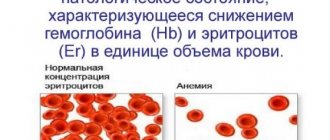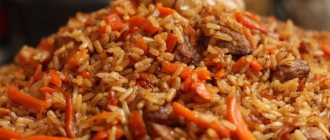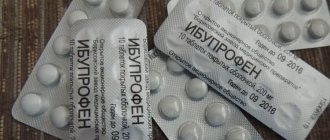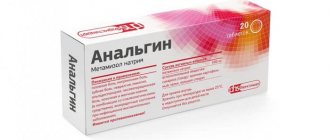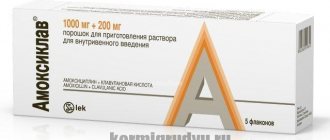Stomach pain when breastfeeding
Pain during menstruation, injury, migraine, tooth extraction - these and other situations require help, but a nursing woman is limited in the choice of medications. Therefore, the doctor is faced with the task of helping the mother and not harming the baby. This does not mean that pain must be endured!
We'll figure out what medications you can take in this article. Dr. Komarovsky, for example, recommends avoiding the use of painkillers while breastfeeding or pregnant, as some drugs simply have not undergone proper clinical studies. However, if a woman cannot tolerate severe pain, there is no point in waiting for it to go away on its own or using dubious traditional methods.
Here are a few rules that will help you quickly deal with the problem and avoid harming yourself and your child: Thus, the ideal time to take the product is after the evening feeding. Babies, even newborns, sleep for 3-4 hours at this time; during this period, the medicine will not only have time to eliminate the mother’s pain, but will also be eliminated from her body, including from milk.
Some young mothers are afraid to go for dental treatment because they read somewhere that anesthesia can have a bad effect on the quality of breast milk.
In reality, this is not so: the doctor gives a local injection, which has a short-term effect and is quickly eliminated from the body, and therefore does not cause any harm to the baby’s health? So it is possible and necessary to treat teeth with pain relief during lactation.
It is better to clarify in advance which drug will be administered to you, and inform the dentist about breastfeeding. In this case, the doctor will select the optimal remedy that will not only provide excellent pain relief during dental treatment, but will also be eliminated from the body as quickly as possible. Now a woman can turn to the Internet for help: just enter the appropriate name of the medicine into a search engine, and several sites will tell you whether it is allowed to be taken during pregnancy or lactation.
For example, there is a universal reference book e-lactation. If we talk about painkillers, which are usually used for severe headaches and toothaches, as well as during extremely painful periods, then here is a complete list of tablets that you can take, as well as intramuscular, external and rectal agents:.
All of these pills are almost certainly in your medicine cabinet. But they are strictly prohibited for women who are breastfeeding. This list includes:. As you can see, there are many more permitted drugs than prohibited ones. So you shouldn’t suffer from pain for fear of harming your child with a single painkiller pill or injection. Of course, there is no need to overuse medications either: if you have a toothache, you need to visit a dentist, if you have constant headaches, you should visit a neurologist to find out their cause and find a way to effectively treat them.
Breast milk is the best nutrition for a baby. The World Health Organization recommends breastfeeding for children up to 6 months. Before using the product, consult a specialist.
The user, leaving his data on the website www. Acceptance of the offer of Consent is the completion of the form with personal data in the feedback form on the website at: www. Category of months Breastfed months Over 1 year Expecting a baby.
Products Baby formulas Ready-made formulas Nutrition for pregnant and lactating women Porridge. Where can I buy. Mom's school. Online consultation. Category of months Breastfed months Over 1 year Expecting a baby Products Baby formula Ready-made formulas Nutrition for pregnant and lactating Porridge Where to buy School for mothers Video 8 99 69 Hotline Online consultation. Home School for mothers Breastfeeding Pain relief during breastfeeding.
Painkillers during breastfeeding Rules of use Dr. Komarovsky, for example, recommends avoiding the use of painkillers while breastfeeding or pregnancy, since some drugs simply have not undergone proper clinical studies. Here are a few rules that will help you quickly deal with the problem and not harm yourself and your child: It is important to understand: painkillers only relieve the symptom, but do not cure the disease itself.
Therefore, in case of painful discomfort, it is recommended to consult a doctor, find the cause of the discomfort and eliminate it. If the root cause is not eliminated, the pain will occur again and again, requiring another dose of medication. There are no prohibitions - take it, and in the recommended dosage. The quantitative transfer of drugs into mother's milk has been studied only for a few drugs.
Therefore, in most cases, you will see that the drug has not been studied during pregnancy and lactation, or pregnancy and lactation are contraindications for use precisely because of the lack of studies on this group. Some mothers try to reduce the harm of drugs by reducing the dose. It is not recommended to do this; the expected effect will not happen, especially if we are talking about products that are acceptable during breastfeeding!
Look in the instructions for an important indicator for us - the drug elimination period. As a rule, it is the same for blood plasma and breast milk. This way you can calculate the period when the drug leaves your body.
Analgesics penetrate into the blood and into mother's milk at the same time: this requires only half an hour, the maximum concentration occurs after 1-1.5 hours. And they appear longer - up to 2-7. The half-life of paracetamol, for example, is about 3, and acetylsalicylic acid - up to 7. This is important! Share Share Share. See also: Should I take baby food on a plane? Read more. We teach the baby to stand with support.
How can you tell if your baby is teething? Mom 2 times! What's new? Goat's milk for infants Read more. Rules for switching from hot water to mixture Read more.
Therapy for refusal of feeding
When a woman decides to switch to artificial feeding in order to comprehensively treat gastritis, for example, if there is severe discomfort caused by the disease, or there is no effect from the above treatment methods, the methods listed below are added to those already listed.
Medicines to get rid of Helicobacter pylori infection
A common cause of the disease is infection with Helicobacter pylori; the use of therapy aimed at getting rid of the microorganism produces the maximum effect.
The destruction of infection is achieved by taking antibiotics (Amoxicillin, Oxacillin) and medications, the effect of which is to destroy Helicobacter pylori (Denol, Tribimol).
If a woman suffers from Helicobacter pylori gastritis, it is better to avoid long-term use of acid-reducing drugs due to blocking the acid-producing glands. With a prolonged decrease in acid levels, the microbe multiplies more intensely, causing an increase in the area of damage.
Diet
When switching to artificial feeding, it is possible to add non-acidic, non-irritating fruits and vegetables to the mother’s diet (strawberries, watermelons, plums, apples, ripe tomatoes, cabbage, potatoes, green peas), which remained prohibited due to the possibility of an allergic reaction in the child.
Normalization of pancreas function
The functions of the pancreas and digestion in the intestines are often impaired due to the presence of chronic autoimmune gastritis (type A). As a remedy, the attending physician usually prescribes the drugs Pancreatin and Festal, and other medications containing pancreatitis (Mezim Forte - can be used during lactation, Panzinorm Forte). If there are difficulties with the motor function of the stomach, take Cerucal, and do the same in the case of B-type gastritis (Helicobacter pylori gastritis).
Normalization of acid balance
If the percentage of acid in the gastric environment is low, replacement therapy is carried out (increasing the amount of the enzyme pepsin along with increasing the acidity of the environment). For this purpose, use Riboxin, oil from sea buckthorn berries in courses for a month, vitamin-containing or multienzyme complexes.
They resort to treatment in hyperbaric chambers by supplying oxygen under high pressure. If there is a high percentage of acid in the gastric environment, it is possible to use Maalox, preferably in the form of a suspension (a tablespoon an hour after eating food), drugs of a similar group are suitable - Almagel, Gastal.
Pain relief
When relieving pain, you should not use drugs that reduce acidity by blocking stomach cells. They will help the development of Helicobacter pylori infection. As a rule, drugs that have a neutralizing effect on acid (almagel, phosphalugel) are used. Take 1-2 spoons for dosage three times a day half an hour before meals.
Their action is to protect the weakened lining of the stomach from the undesirable effects of perchloric acid and pepsin contained in the gastric environment. Pain cessation is expected within half a week after starting use.
Medicines for nursing
My stomach hurts terribly. It’s already sick, I used to often take Almagel, ranitidine and all sorts of similar drugs, but now I read the instructions everywhere, a contraindication: the period of breastfeeding. I also have terrible pain! Chronic gastritis, and even in some complex form! Now I'm breastfeeding, so I only save myself with phosphalugel! This is probably the only thing that is possible with breastfeeding. Maybe he will save you too! And yet, I drink 2 minamum sachets at a time! Healthy Stomach is no joke at all!
Contraindicated during breastfeeding.
What to do to avoid unpleasant sensations?
Slight discomfort at first, when mother and child adapt to each other, when the amount of milk has still become a constant value, can be reduced by observing hygiene measures. Take a shower every day, put special absorbent pads in your bra, and lubricate your nipples with emollients. Do not wear tight, too tight underwear - this contributes to the accumulation of bacteria and congestion in the chest. And feed the baby on demand, in a position that is comfortable for both. Soon contact will be established between the young mother and child, and all unpleasant sensations will go away. Both mother and baby will begin to experience mutual pleasure from feeding, as prescribed by medical guidelines.
To prevent congestion in the chest, do not eat fatty foods, protect the chest from hypothermia (you need to pay particular attention to this point if the ducts in the chest are narrow). Regular feeding and “proper” hygiene will help avoid pain. Mechanical sparing of the chest is also important: try to sleep in a position where the chest is not compressed, do not allow the child to accidentally hit the chest.
Nagging pain in the lower abdomen during breastfeeding can be physiological in nature. Sometimes they indicate the development of certain pathological conditions. In the latter case, there are indirect symptoms by which the doctor is able to recognize and establish a specific disease. A woman should be able to identify and describe them.
What medications should breastfeeding mothers never take?
First of all, we will give universal advice: do not believe the information found on the Internet. Which, by the way, needs to be communicated not only to the fact that you are breastfeeding. The medications that the doctor prescribes also depend on the following things: In the second case, children's organs may not yet be developed enough to cope with even minimal doses of medication; If the baby is low in weight, the recommendations may be completely different. And yet, only those drugs that are prescribed to infants can be considered fully safe.
Since the birth of a newborn child, every young mother faces a number of difficulties that arise in her health and well-being. During the period of bearing a child and breastfeeding, it is not uncommon for a woman to experience discomfort and pain in the stomach area.
Pain during menstruation, injury, migraine, tooth extraction - these and other situations require help, but a nursing woman is limited in the choice of medications. Therefore, the doctor is faced with the task of helping the mother and not harming the baby. This does not mean that pain must be endured! We'll figure out what medications you can take in this article. Dr. Komarovsky, for example, recommends avoiding the use of painkillers while breastfeeding or pregnant, as some drugs simply have not undergone proper clinical studies. However, if a woman cannot tolerate severe pain, there is no point in waiting for it to go away on its own or using dubious traditional methods. Here are a few rules that will help you quickly deal with the problem and avoid harming yourself and your child: Thus, the ideal time to take the product is after the evening feeding. Babies, even newborns, sleep for 3-4 hours at this time; during this period, the medicine will not only have time to eliminate the mother’s pain, but will also be eliminated from her body, including from milk.
How to treat
In order to effectively treat gastritis during breastfeeding, many women often use some types of herbal infusions.
These natural remedies can have a mild analgesic and calming effect, however, by and large, their effectiveness has not been proven scientifically.
When a woman in labor is diagnosed with gastritis, it may be useful for her to use herbal remedies that have an enveloping and analgesic effect.
These include:
- chamomile;
- flax seeds;
- oats;
- dill fruits;
- liquorice root.
Tinctures from these herbs, in fact, can relieve the symptoms of pain in women after childbirth. Mint also reduces the level of lactation, so you need to drink decoctions from it with extreme caution.
In order to reduce gastritis pain during breastfeeding (that is, after childbirth), it is recommended to take one spoon of flax oil in the morning on an empty stomach.
There is also a certain list of medications that, in rare cases, can be used to treat gastritis during breastfeeding, however, their effect on young children has not yet been studied.
These medications consist of:
- Gastrosidine (Famotidine).
- Digestala.
- Mezima.
- Pancreatin.
- Festala.
After childbirth, it is prohibited to take unsafe medications such as Controloc (Pantoprazole), De-Nol, Helicocin.
Among the recognized safe medicines one can note drugs like Cimetidine, Enterosgel, Gasterin.
Pain can be reduced by using Smecta, however, this remedy is not able to eliminate the causes of the disease.
You should carefully use medications such as Maalox, Almagel, Gastal, and Gaviscon.
In order to quickly relieve pain, it is allowed to use such a popular remedy as No-spa (it is often used both before and after childbirth).
If there is very severe pain accompanying gastritis, it is necessary to immediately treat gastritis. To do this, it is recommended to temporarily switch the baby to formula.
When treating stomach inflammation, it is worth remembering that if a mother has plans to breastfeed her baby in the future, she should try as much as possible to maintain the presence of milk.
In order to maintain lactation after childbirth, it is necessary to drink vitamin complexes specifically designed for nursing mothers, as well as massage the chest area, constantly express milk, and drink a sufficient amount of clean water during the day.
It is not recommended to take medications without consulting a doctor, because only an experienced doctor is able to identify the type of disease after conducting an appropriate analysis of the stomach contents and obtaining the result of an ultrasound examination.
Before starting treatment, it is necessary to search for a highly specialized specialist (usually a gastroenterologist) and strictly adhere to all his prescriptions.
When gastritis is characterized by mild symptomatic manifestations that do not cause serious problems, and a woman decides to treat gastritis without using artificial feeding, she needs to follow a number of rules.
First of all, it is necessary to normalize the daily routine and the whole way of life. A woman should be attentive to regular rest and sufficient sleep during therapy.
It’s a good idea to allocate at least 2 hours a day for sleep, as well as adjust your routine to your baby’s – both need to fall asleep at the same time.
After giving birth, a woman needs to be in the fresh air as often as possible.
In addition, an important point is to eliminate factors that provoke the development of stress (psychological and physical stress, excessive housework, etc.).
During gastritis, a nursing mother's food intake should be regular, frequent (up to six small portions per day) and complete.
If the symptoms of the disease worsen, doctors advise consuming more different light soups with cereals;
- oatmeal and buckwheat with water;
- not too fatty vegetable stew;
- fermented milk products, etc.
In general, it is necessary to eat foods that will not irritate the gastric wall, but, on the contrary, will create an enveloping effect.
The chronic form of gastritis is a very common type of disease, which can go into an exacerbation stage at some periods of life due to poor diet, excessive food consumption, prolonged nervous tension, a weak immune system, and also as a result of hormonal changes in a woman’s body.
With a high degree of probability, aggravation of symptomatic manifestations can be observed both during pregnancy and after childbirth.
It is worth noting that normalization of the condition after the discovery of gastritis during breastfeeding is quite possible.
For this purpose, it is recommended to consult a gastroenterologist in advance and find out what type of treatment will be most effective for the woman in labor.
Diet after childbirth
A woman’s nutrition during lactation simultaneously pursues several different goals. The daily diet should not only help satiate the baby, stimulate a sufficient amount of milk in the woman, but also help the physical recovery of the female body after childbirth.
But still, the main distinguishing feature of the diet during lactation should be the complete safety of products for mother and baby. To do this, all dishes must be fresh and prepared from quality ingredients. This will help avoid digestive problems and constipation.
First of all, a young mother needs to replenish her daily intake of proteins, fats and carbohydrates. And according to experts, a woman’s energy loss per day is about 1000 kilocalories. How to compensate for such a loss:
- Meat products such as poultry, lamb and young beef are allowed for a nursing mother. Pork remains prohibited until 3-4 months of breastfeeding. There are no restrictions, but you should not focus on sturgeon fish and caviar. These products are highly allergic and may be harmful to the child.
- When drawing up a diet, you should remember the need for a large amount of dietary fiber, the source of which is black and gray coarsely ground, raw vegetables. These products will help avoid problems with the gastrointestinal tract in the mother and baby, and will reduce the risk of developing a situation where a young mother has a stomach ache when breastfeeding.
- Fresh fruits, vegetable and olive oil are allowed. Sweets should be limited during this period, as glucose can cause distress in the baby.
- You should not drink carbonated drinks.
Watch the video about nutrition for a nursing mother:
But there are also a large number of foods that a young mother during lactation should completely exclude from the diet or severely limit their consumption. This includes any vegetables and fruits that cause allergic reactions. Citrus fruits, tropical fruits, strawberries, raspberries and even regular onions and garlic are prohibited during this period.
Of course, any alcoholic beverages, tobacco, strong tea, honey, chocolate and much more are completely excluded during breastfeeding.
Abdominal pain during breastfeeding is quite common and, as mentioned above, its causes can be very diverse. A woman during lactation has a rather fragile body with impaired functions, so if any painful symptoms occur, you should immediately consult a doctor. Self-medication during this period is criminal in relation not only to your health, but also to the health of the little person.
Painkillers for toothache
Toothache is one of the few conditions that simply cannot be tolerated. Of course, at the initial stage, you can resort to folk recipes or look for treasured points on the wrists on the advice of Thai medicine, but the night is so long, and you will only get to the dentist in the morning. Is it possible for a nursing mother to numb her teeth? Don’t worry, of course it’s possible, but not every remedy is suitable for this.
Allowed painkillers for toothache
The list of permitted drugs for nursing mothers includes Ketanov and Lidocaine:
- The Ketanov tablet will temporarily relieve acute pain, but you should not abuse the drug. The medicine will not remove the cause, but only muffles the pain;
- Lidocaine and its analog Ultracaine are used topically as an injection for sanitation and dental treatment.
As a dental pain reliever while breastfeeding, you can borrow ointments for painless teething for your baby:
- Kalgel based on Lidocaine;
- Traumeel ointment, which is a homeopathic remedy; The possibility of using Traumeel during breastfeeding is described in detail in the article Traumeel for lactostasis>>>
- Kamistat Baby gel, in addition to Lidocaine, contains chamomile extract;
- Dentol Baby – cools, relieves pain and relieves inflammation.
Please note that all the remedies listed above are not therapeutic agents; you can relieve toothache for a while, but you cannot do without a visit to the dentist. Read more about dental treatment for a nursing mother>>>.
Treatment
During the period of breastfeeding, a young mother cannot afford to use the list of medications that are approved for other people. This prohibition is due to the fact that any substances that enter the mother’s body, after some time, reach the body of the newborn baby through breast milk. Treatment for stomach pain in a nursing woman depends on the cause that caused the condition. Medical specialists offer the following ways to solve this problem:
- If the cause of the malaise is a violation of the diet and disorders of the digestive function, a nursing woman needs to take one of the enzymatic medications. Preparations containing pancreatic enzymes include Pancreatin, Creon 10000 and Vestal. The dosage and frequency of taking such medications should be discussed with the attending medical specialist;
- If a young mother feels not only pain, but also symptoms such as sour belching and heartburn, then this condition indicates excessive production of hydrochloric acid in the stomach. Enveloping and antacid medications will help to cope with this condition. Prominent representatives are Maalox, Almagel and Phosphalugel. These products are safe for the mother and newborn baby. They help reduce the production of hydrochloric acid and have a protective effect on the walls of the stomach.
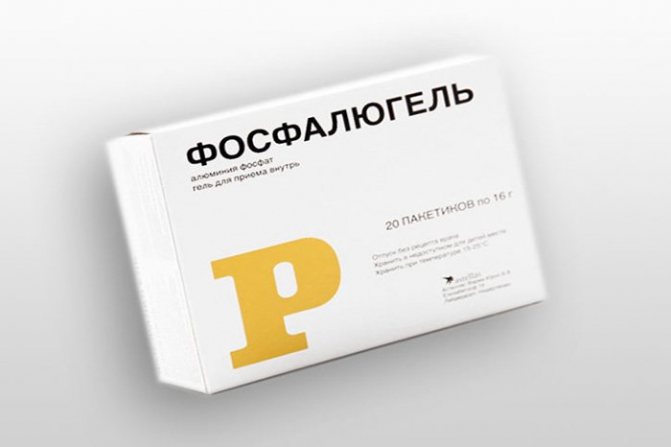
In order to avoid digestive problems, a young mother needs to normalize her diet. It is important not to consume foods such as rye bread, vegetables high in fiber, whole milk, fried potatoes and legumes. These food components can cause excessive gas formation in the intestines not only in a nursing woman, but also in a child. And what you can and should eat during lactation, read the article at the link https://vskormi.ru/mama/chto-mojno-est-kormiaschei-mame/.
How to get rid of abdominal pain during lactation
To eliminate discomfort, you need to clearly understand what could provoke it.
- Stomach pain is relieved with Smecta or Enterosorbent. Taking them helps eliminate heartburn and remove toxins from the body. Almagel relieves heaviness and the feeling of fullness well.
- If you have symptoms of pancreatic dysfunction (nausea, vomiting after eating, impaired bowel movements), you need to take an enzyme preparation. Pancreatin is allowed for breastfeeding women. The maximum dose is three tablets. Exceeding doubles the likelihood of constipation or diarrhea in infants.
- Dill water and Espumisan help relieve symptoms of intestinal colic.
- You can fight constipation with Regulax. This laxative does not pass into breast milk.
It is important to create a menu correctly and include safe products in it. During lactation, a woman should eat:
- lean meat;
- sea fish (except sturgeon and caviar);
- cereal porridge.
You cannot eat onions and garlic, marinades and spices, spicy and salty foods, fatty and fried foods, confectionery, or drink tonic drinks. Only by following a diet can you improve digestion and get rid of nagging pain in the lower abdomen.
The main reasons that affect the occurrence of stomach pain
in a nursing mother are:
- Descent of the stomach This refers to the prolapse of an organ after childbirth. As you know, during pregnancy, all organs move slightly from their usual location to allow the baby to grow and develop. But after childbirth, they return to their normal position, but they may return to a slightly different position, but this is just a little bit. Although this is often enough for some mothers to feel pain in the abdominal area.
- Stress Stable psycho-emotional stress that occurs after the birth of a baby affects the health of the mother. Constant worry about the child, lack of sleep, malnutrition, especially the first months, play a huge role. And as a result of this excitement, the stomach produces more gastric juice, which is acidic and corrodes its walls, causing inflammation and other consequences.
- Changes in the daily diet When a young mother breastfeeds her baby (and this is very correct, no formula can replace mother’s milk!), She will face changes in her diet. Some foods should be excluded for a certain period, and some, on the contrary, should be eaten generously. This change also puts stress on the stomach.
- Exacerbation of chronic diseases When, before pregnancy, a woman had diseases such as gastritis, pancreatitis, cholecystitis, gastroduodenitis, then after pregnancy they can worsen and stomach pain will become a frequent symptom.
In addition, stomach pain during breastfeeding
can cause the following diseases:
- pleurisy;
- intervertebral hernia;
- kidney disease;
- inflammation of the uterus.
Symptoms
The main symptoms of indigestion are:
- nausea;
- discomfort and heaviness;
- weakness occurs;
- heartburn;
- sour belching;
- vomiting reflex;
- constipation or diarrhea.
How to treat?
Treatment for a nursing mother is significantly different from treatment for any other person. Because any drug will get into the milk and can harm the baby, who is not yet ready to use various types of drugs. Therefore, treatment should be selected only with a doctor. Among the medications that the doctor will prescribe may be:
- Pancreatin,
- Creon,
- Vestal,
- Almagel,
- Phosphalugel,
- Maalox.
Deviations from the norm in a nursing mother
What symptoms may occur when a nursing mother is sick? One of the first signs of illness is an increase in body temperature. Be careful when measuring it. If you feel pain in your chest and the thermometer shows 38⁰C, and your condition is not too different from normal, then most likely it is inflammation of the chest. Sometimes it is enough to perform additional pumping several times, and the woman’s condition improves. In some cases, antibacterial treatment is necessary, but feeding the child is acceptable. In case of purulent mastitis, breastfeeding should be stopped. It is worth measuring the temperature in the groin, it characterizes the condition of the uterus.
In the maternity hospital, the nature of the discharge is checked. They should then be checked daily. If they become yellowish or acquire an unpleasant odor, you should immediately consult a doctor. This may indicate a violation of the recovery period, inflammatory processes in the uterus. During the first two weeks after birth, the uterus is poorly protected from infection. Therefore, it is necessary to especially carefully monitor the hygienic condition of the external genitalia. It is recommended to resume sexual relations no earlier than 12 weeks after birth.
Return to contents
Painkillers after cesarean
Half of women who gave birth to a baby by caesarean section experience pain in the groin area. Taking painkillers after cesarean section while breastfeeding is acceptable.
- You can use No-shpa unsystematically; by the way, this drug is also available in injection form;
- In gynecology, Ultracaine is widely used, which provides excellent and long-lasting pain relief, while being absolutely safe for babies.
If the pain is prolonged, there is discharge or the stitch does not heal for a long time, then you need to consult a specialist.

